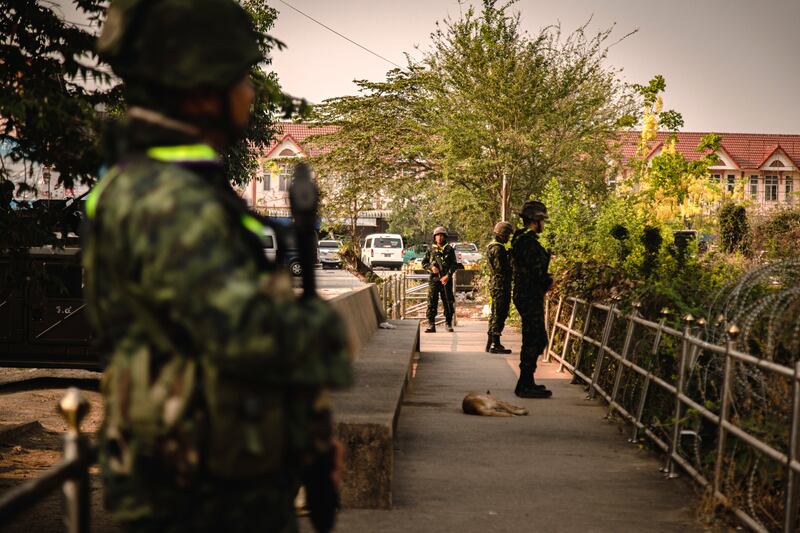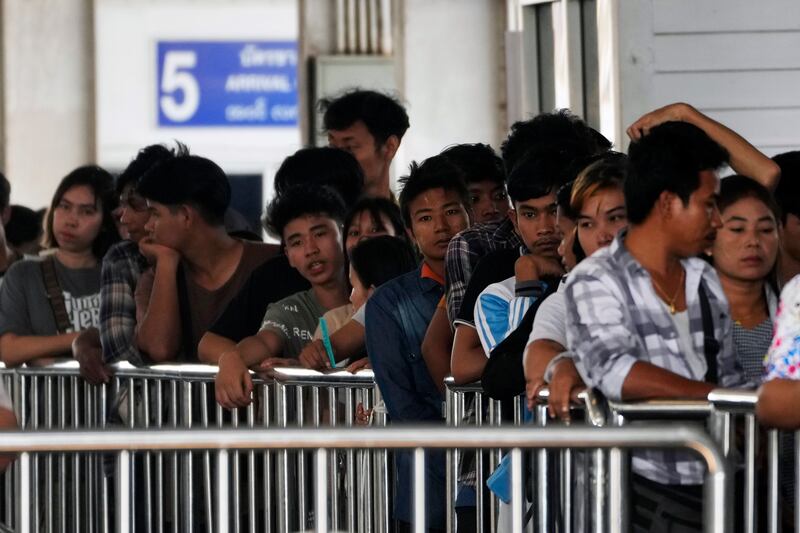As fighting intensified between Myanmar’s military government and opposition forces near the border with Thailand, the top Thai diplomat on Friday urged all parties to engage in dialogue and reduce violence, while an analyst urged Bangkok to provide humanitarian assistance.
Thai Foreign Minister Parnpree Bahiddha-Nukara made the announcement during a visit to the border region, a day after anti-junta forces said they had driven the junta's last battalion from a major trade hub in Myanmar's Kayin state across the border from Mae Sot.
“Thailand has sent messages to the Myanmar government several times and ASEAN has also conveyed its message,” Parnpree told reporters during a news conference in Mae Sot, referring to the Association of Southeast Asian Nations.
Parnpree said the Thai government had reached out to Myanmar’s State Administration Council – the official name for the Burmese junta – to call for an end to the violence.
"Most recently, there have been discussions within ASEAN about issuing a statement calling for a reduction in violence in Myanmar and encouraging dialogue in line with the ASEAN five -point consensus," he said.
Violence in Myanmar has been escalating since the Feb. 1, 2021, military coup ousted President Win Myint and State Counsellor Aung San Suu Kyi. It led to civilian groups and ethnic minority forces to battle against the military government.
In April of that year, the leaders of the 10-member ASEAN agreed to a five-point peace plan for Myanmar during an emergency meeting in Jakarta, which was attended by Senior Gen. Min Aung Hlaing, the Burmese junta chief. Since then, the Southeast Asian bloc has largely been criticized for failing to press the Myanmar military government to abide by the plan.
Meanwhile, two months ago, the Myanmar government introduced new conscription regulations, prompting some citizens to flee to Thailand to avoid being drafted.
The Karen National Liberation Army (KNLA), the Karen National Union (KNU), and the People’s Defense Force (PDF) launched a major offensive, declaring control over Myawaddy, a strategically important town near the Thai border.
“Thailand’s primary concern is to see peace restored in Myawaddy, not just for the sake of trade relations. If the various groups in Myanmar can engage in talks among themselves, Thailand would be pleased and ready to act as a mediator and coordinate efforts,” Parnpree told reporters.
“However, the current situation has already impacted trade between the two countries, which was substantial in the past but has decreased by several percentage points, a decline that began during the COVID-19 pandemic.”

Experts said the fighting could continue for some time as the Myanmar military attempts to recapture Myawaddy, a vital economic lifeline for transporting goods and supplies into Myanmar.
“Although the KNU and its allies currently have the upper hand over the SAC in Myawaddy, it is believed that they are not yet able to control the road to Yangon. The Myanmar military is unlikely to give up easily because this route is crucial for transporting goods and supplies from Indochina and Thailand into Myanmar,” analyst Dulyapak Preecharush told BenarNews.
“Therefore, they must try to regain control of the road, as it is a vital economic lifeline. This is why we are hearing news of tank movements, which will prolong the fighting,” said Dulyapak, an assistant professor of Southeast Asian Studies at Thammasat University.
He noted that “there will be violence spreading near the border. If there is fighting, people will definitely flee into Thailand,” he said while calling on Bangkok to provide humanitarian assistance.
“If people are injured, they should be allowed to come, without discrimination, regardless of which side they are on, including officials. Not being biased will prevent the Myanmar military from accusing us of taking sides.”
Pornsuk Kerdsawang, an aid worker with Friends Without Borders Foundation based in Mae Sot, said the escalating violence had led to an increase in internally displaced persons (IDPs), adding the Thai government should provide assistance.
“In Karen State, there are already 750,000 IDPs. It is believed that if the fighting moves closer to the border, these people may have to cross into Thailand to seek refuge,” Pornsuk told BenarNews. “What the government can do is to try to talk to civil society in the area to understand their real needs and provide the most effective assistance,” Pornsuk said.
"In March, Thailand set up a humanitarian corridor to send aid, but it is unclear whether it addresses the root of the problem. The main reason for displacement is attacks by the Myanmar military, the use of artillery, and airstrikes."
Pornsuk called for the Thai government to negotiate a ceasefire or talk to ethnic armed groups to identify safe areas for delivering targeted assistance.
Thailand as mediator
Lalita Hanwong, a historian at Kasetsart University and adviser to the Thai government on national security issues, also called on the government to mediate negotiations to end the conflict across the border.
“No one is better suited than Thailand to take on this role. To achieve peace in Myanmar, it is crucial to engage in dialogue with all groups, including ethnic groups and stakeholders, by finding appropriate ways to encourage the Myanmar military government to accept the proposals of ethnic groups,” Lalita told BenarNews. “Resolving the issue requires cooperation from all sectors; otherwise, the prolonged war will never end.

The historian said the Thai government should move quickly and be prepared for multiple scenarios.
“For example, if Myanmar is fragmented, Thailand should have a direction for talking to the Shan, Karen, Karenni and Mon. What will be the direction of the relationship with these ethnic minorities? Because if we only have formal talks with the SAC, but in the future, there are no SAC-controlled areas, how will Thailand interact,” she said.
Boonsong, 61, a Thai tour van driver in Myawaddy who asked that his full name not be used, said the economy was able to thrive at a time when violence had ceased. He said the recent surge is unfortunate as it comes just before the Songkran (Thai New Year) festival beginning on Saturday.
“The impact on people making a living is that tourists from far away are afraid to come because the news reports that there is fighting and shooting. This has led to a decrease in tourism,” he told BenarNews.
“Normally, this is a festive period when many people come to visit, but now it is quite quiet. In Myawaddy and around the Bayint Naung Market and Myawaddy Complex, customers have completely canceled their trips.”
Ruj Chuenban in Bangkok contributed to this report.
